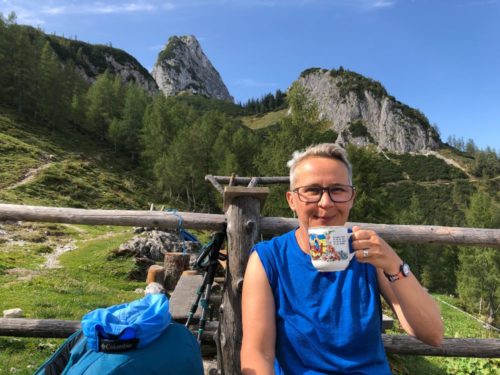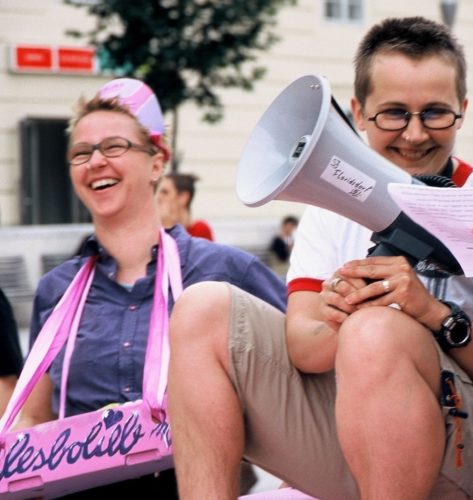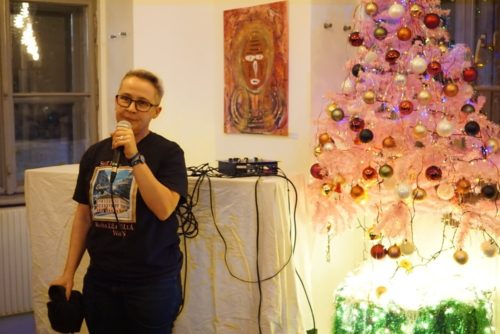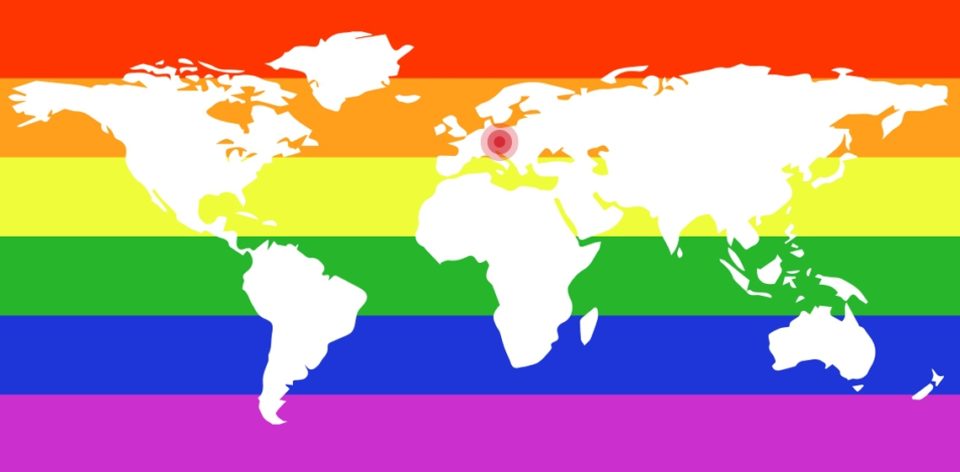Welcome, Karin! Can you introduce yourself please?
My name is Karin Schönpflug, I am situated in Vienna, Austria, where I have lived most of my life. I am an economist focusing on issues of feminist and LGBTIQ economics. I have been working as a volunteer in Vienna's Türkis Rosa Lila Villa for 25 years, engaged in counselling, coming out groups, community building and also political activism. I have been taking part in organizing the Vienna Dyke marches since 2004. In addition, I am a member of the EL*C, the European and Central Asian Lesbian* Community, and also a Vienna based feminist drumming group. In the summers I usually go to Femö Camp in Denmark, or to Lesbos Women's* Festival. This year I was mostly hiking and mountaineering in Austria due to travel restrictions.

That also sounds (and looks) awesome. Now let us talk about Austria. How would you summarize the general situation of the LGBTQ+ community over there?
In Austria the situation of the LGBTIQ community has improved greatly in the last decades. For a long time, Austria had quite strict laws, which have been changed mostly by the courts rather than the parliament. It is now possible to get married or partnered, parenting and adoption is legal for same sex couples as well. Anti-discrimination legislation exists for in-work cases but is not available for goods and services or in the health sector. The situation is most dire for intersex persons, as it is still legal to mutilate babies in order for what is considered "gender-correction", adult inter*persons still cannot decide their gender without professional Sanctus.
What’s the situation in Vienna specifically? When Hungarians want to have a small taste of “a better life”, they tend to pop by Vienna.
LGB couples in Vienna are often living quite openly, especially in the trendier districts, but are for instance careful about holding hands in parts of Vienna that feel unsafe, as we learned not only from the survey by the EU (2020) but also by an online questionnaire we conducted especially for the Viennese community a few years ago. In the Pride month, the city and official buildings, many companies, even schools, are hoisting rainbow flags; trams will fly the flag and there is good funding for Pride activities, a Pride village, and culture events. Many larger companies will have LGBT groups and there is somewhat a consent in the population that it is "OK to be gay".
Still, street violence is existent, and like almost anywhere trans-women or gender non-conforming persons are most affected. In schools there is a lot of bullying and mobbing going on, also mostly affecting kids with non-normative gender performances. Currently, queer bars and restaurants are suffering dearly from closures in the pandemic, but there is hope for a resurrection. There is a center for Rainbow Families, and the community in Vienna is working hard to support LGBTIQ refugees, as with the project "Queer Base". There are two community centers in Vienna, Türkis Rosa Lila Villa and Hosi and there are sports clubs and lots of cultural activities.

That sounds like a lot on offer. How is the social life for lesbians specifically?
Lesbian social life in Vienna is a little bit like in a small village where a lot of people will know each other, but it is quite radiant. There are generally quite a lot of parties for younger people organized in large venues. There are also smaller events and parties for older lesbians and there are several Facebook groups promoting happenings and get togethers mostly in queer places. Some very much enjoy the Regenbogen Ball, a queer ballroom event, but there are also trendy venues for the younger queer crowd like FLINTE Café and there is a very active queer students' union. The café in the Türkis Rosa Lila Villa offers events like Karaoke, speed dating, discussion circles, movie nights and has a very international crowd, drawing students from CEU, international workers, refugees, long time locals and generally fun people; it has also become an important place for Vienna’s Black community. Lately, the community has been a bit scattered coming to terms with racism, sexism and transphobia within its own ranks. One of the coincidental victims in the terror attack in Vienna in 2020 was a long-time lesbian activist, a huge loss for the community.

Finally, can you share a funny, memorable, or inspirational coming out story of yours?
Coming out is generally seen as a memorable, important step that every queer person should take like a rite of passage. Still, I think usually people will know if it is a thing increasing happiness and generating personal realness and identity or whether it is an unsafe act that may be best avoided at that point or in that specific context. This can only be judged by the person themselves. Also, you get better with experience, finding out when it is good to come out and when it may be not that helpful. Coming out to your church group leader may be a good idea, but maybe not very helpful. If you don't want to worry about these decisions, choose to come out in an interview on national TV as I did in the 90s, for me it turned out well, as I picked the afternoon program for seniors, mostly friendly folk. When I went to Kiev for the EL*C conference in 2019 I was hiding my rainbow sticker on my backpack trying to look very normal as our hotel was blocked by weird religious groups with crosses and teargas. - It is good to be out and it is good to be safe.

